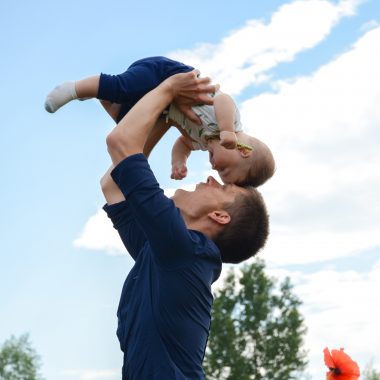In balanced and healthy parenting, active participation from both mothers and fathers is essential. It’s crucial to recognize that the father-child bond holds equal significance as the mother-child bond. Scientific evidence unequivocally demonstrates that children whose fathers are actively involved during their upbringing encounter fewer behavioral issues and exhibit enhanced social and academic development.
Research findings from over 80 percent of studies investigating father-child relationships consistently affirm the profound connection between a father’s engagement and the overall well-being of their infants. This connection extends beyond infancy, positively influencing a child’s growth and shaping them into well-rounded individuals.
There are three compelling reasons to embrace the role of an involved and supportive father: it benefits your child and you and strengthens your relationship with your partner. By actively participating in your child’s life, you contribute to their optimal development, experience personal growth, and foster a deeper bond with your partner.
- Studies have shown that when dads are actively involved with their infants, their children are more secure, confident, independent, and more interested in exploring the world around them than babies deprived of quality time with their fathers in the first year. Infants with supportive fathers are more comfortable around strangers, handle stressful situations better, and perform better on motor development and intelligence tests.
- The more involved you are and the more you support your partner, the happier they will be in the relationship and the better they will perform as a parent. When your partner is a happy person, you will be as well. This benefits your relationship.
- Being an involved and supportive father will affect you in many ways. You’ll learn to feel, express and manage emotions (positive, negative, and everything in between) you never knew you had. You’ll be more empathetic and better able to see things from others’ perspectives. Furthermore, fathers actively involved with their children tend to be mentally and physically healthier and more likely to advance in their careers.
So, here is the question! What does being a supportive and involved father mean?
Being a supportive and involved father means different things to different people. Here are the most common definitions:
- Being there physically and emotionally and being available right from the start.
- Being hands-on in the daily routine (feeding, bathing, reading, playing, showing affection etc.).
- Being an equal partner in parenting.
- Being a role model.
- Being a good provider (financially) and protector (keeping the family safe).
Being an involved father is wonderful but takes time, willingness, and sacrifice.
We hope the following 14 tips for being a supportive and involved father will guide you throughout your parenting journey.
Share responsibilities equally
Eradicate the idea that anything qualifies as “mom duties.” As a partner, parent, husband, and father, you need to be involved in everything and share the work with your baby’s mom. Changing diapers, giving baths, getting your little one dressed, and feeding them (whether it is formula or bottled breastmilk) are all duties that both partners should share. A lot of men still perceive certain duties as “mom duties.” Don’t be one of them.
Seek involvement early
Show your interest early on by understanding your role as a father during pregnancy. When fathers are involved, they send the clear and emphatic message: “I want to be your father. Our relationship is very important to me.”
Research shows that fathers who play an active role during pregnancy often lower the mom’s stress levels. And lower stress levels mean a healthier environment for the growing baby.
Spend time with your child
Time is the only thing that you can truly give your child. Kids grow up quickly, and the time to bond is now. Make sure you connect with your child on a daily basis.
Sparing some time to connect with your child means a lot to them. Children feel supported when they know they are cared for, encouraged to grow, and feel a sense of belonging in your family. Becoming a supportive parent is about understanding your child’s world, including their feelings, fears, and frustrations, without making the situation about you. When you create this connection with your child, you’re actually creating an environment of support and helping them feel like they belong.
Discipline with love and positive parenting
All children need positive guidance and discipline. Reasonable limits are a must. Fathers who discipline in a calm and fair manner show love for their children. Parenting experts say effective discipline means guiding and redirecting your child with love, not fear.
Be as empathetic as possible
Empathy is the ability to put yourself in someone else’s shoes and understand what they are feeling or experiencing. In the early years of life, a child is naturally ego-centric and is very much inclined to think about their immediate needs. Being able to empathize with your child means you can place yourself in their shoes. When you empathize, you become a safe place for your child to reach out to when experiencing difficulties.
Enjoy being your child’s student
Parents can learn so much from their children. Being your child’s student means taking time to observe and reflect. By doing this you enter your child’s world. The key here is to remember that your child is a separate person from you. A child feels seen and valued when a parent enjoys being their child’s student.
Be your child’s role model
As experts say, children watch their parents and imitate them right from infancy and there is a tremendous amount of learning before kids even develop linguistic skills.
When you lead your best life, your child notices and takes note of it. From your diet to relationships, you can guide your child’s development by being a good role model.
Eat together as a family
An important part of healthy family life is bonding through family meals. Meals help family members maintain relationships and feel a sense of belonging.
- Children who can count on regular time with a parent or adults feel loved, safe, and secure.
- Children set roots for a lifetime as they experience their family’s values and traditions.
- Listening to grownups at the table exposes children to new words, which helps them expand their understanding and vocabulary and even helps them read better.
Read to your child
Reading to your child is an important way to help them build language skills. It exposes them to new words and ways of using language. Furthermore, according to some researchers, fathers serve as reading models to their children.
- Reading strengthens the relationship between father and child. It promotes bonding time and helps fathers and children to feel closer emotionally and physically.
- Sharing a book helps develop fine motor skills by having your child turn the pages or hold the book.
Respect the other parent of your child
Parents who respect each other and show mutual respect to their children provide a secure environment for them. Children growing up in an environment where parents respect each other are more likely to feel that they are also accepted and respected within the father-child relationship.
Don’t forget: A sense of humor is necessary
There will be times when your child does something that might make you blow your lid, like writing all over the walls of your house. While you need to teach your child not to do these things, sometimes it’s better to laugh at the humor of the situation.
Being a parent is one of the most fulfilling experience you can have. But it can also be quite stressful. Humor can make parenting easier. Humor puts things into perspective for parents and stops them from taking every hiccup too seriously. It also diffuses tense situations and helps parents connect better with their child.
Support and stand by mom
A father and mother should work together as a parenting team and stand by each other’s decisions. A healthy alliance between father and mother creates a secure environment where a child is more likely to attain appropriate emotional and behavioral balances as they grow. Consistent communication, united responses, and presenting an allied front are important factors in supporting your child in this journey of growth and development.
Teach your child independence
Teach your child to do things independently from an early age, gradually encouraging more independence as they grow older.
While it may seem difficult and time-consuming to teach your child to do something that you could do much faster, in the long run, it is very important for your child’s self-esteem and self-confidence.
Allow your child to make their own decisions
Kids like freedom and making decisions, just like any other human being. As a father, you must allow them to make decisions within the parameters you set. For example, give your child a choice between two healthy breakfasts rather than allowing them to eat a bowl of sugar if they choose to.
References: thefatherhoodproject.org, fatherly.com, greatergood.berkeley.edu, nct.org.uk, livescience.com










